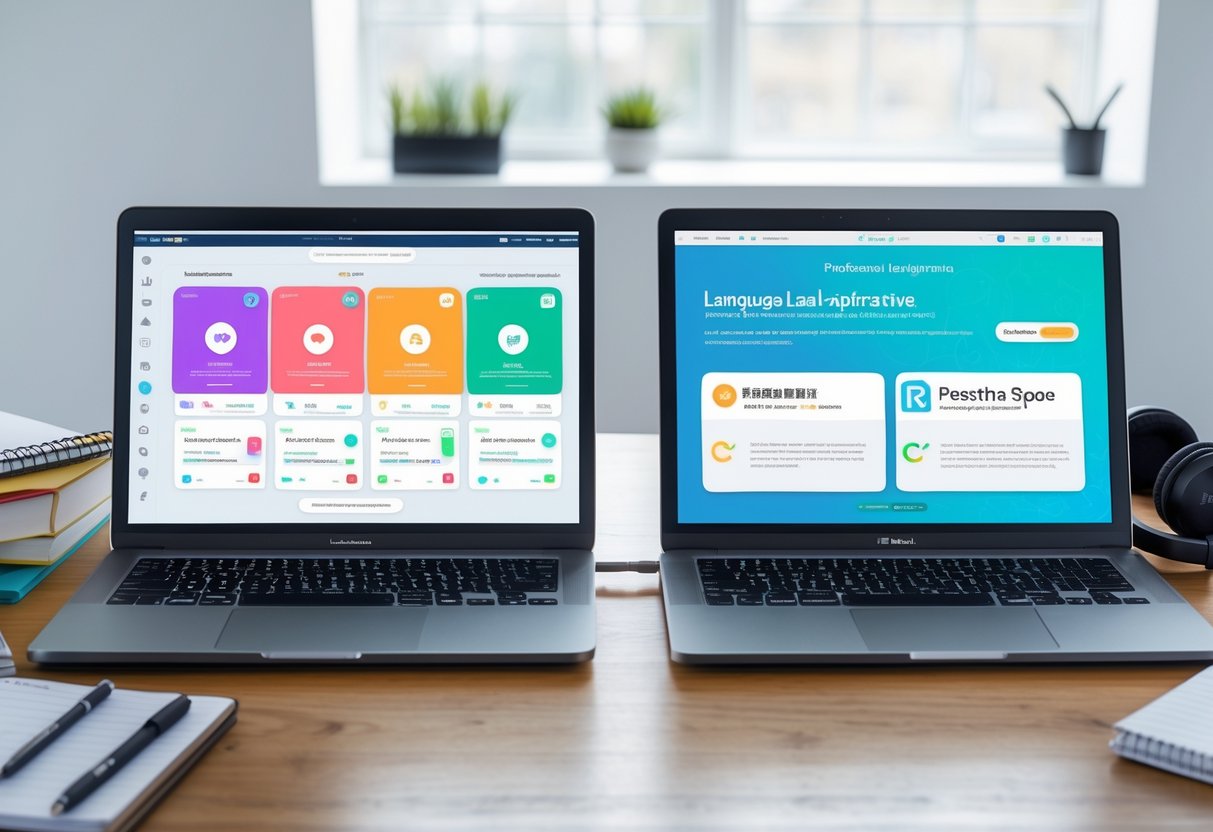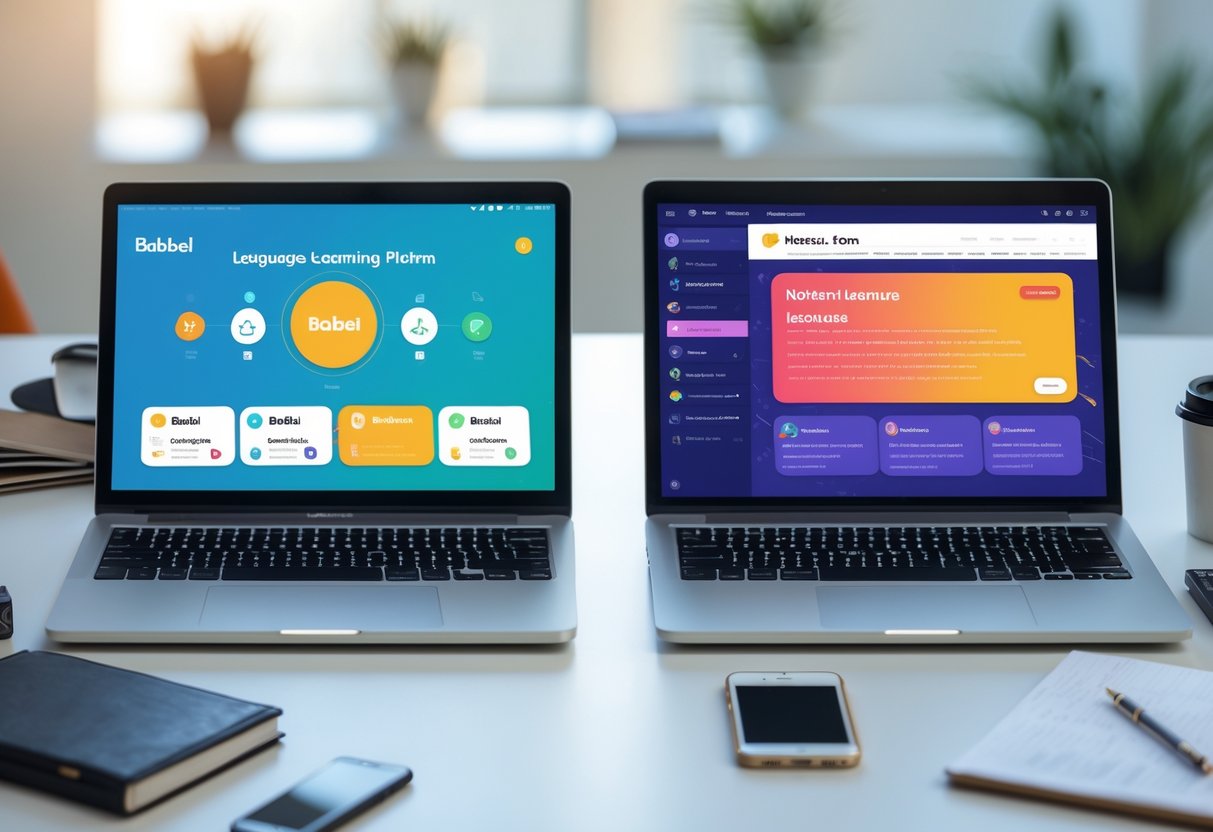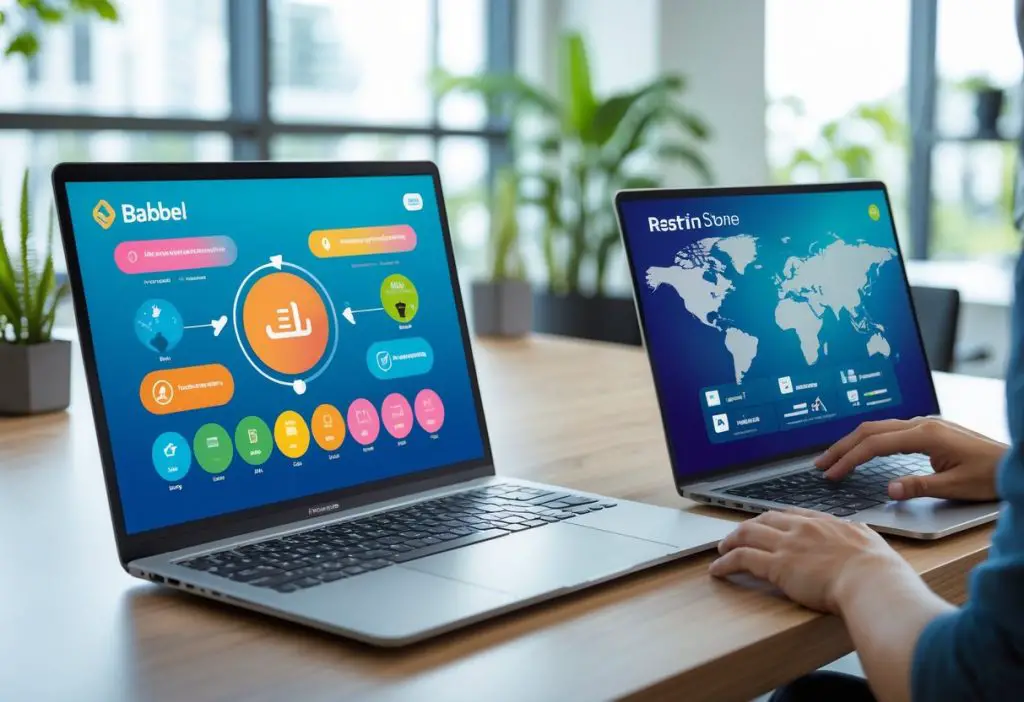Trying to decide between Babbel vs Rosetta Stone for learning a new language can be tough. Babbel is known for short, practical lessons, while Rosetta Stone focuses on full immersion and visuals.
You want to make the best choice for your learning style, budget, and goals. This guide compares their main features so you can pick the right fit.
Key Takeaways
- Babbel and Rosetta Stone use different teaching methods
- Each platform offers unique user experiences
- Choosing depends on your goals, learning style, and budget
Core Differences Between Rosetta Stone vs Babbel
Rosetta Stone and Babbel are both well-known language learning platforms. Their teaching styles, lesson formats, and language options are not the same, which can make a big difference depending on your learning needs.
Overall Teaching Approach
Babbel uses real-life conversations and grammar explanations to help you understand how to speak and write. Its courses are designed to be practical, focusing on speaking skills, useful phrases, and how to use grammar in daily life. Babbel also uses the spaced repetition system to help you remember words and phrases over time.
Rosetta Stone teaches new languages using its “Dynamic Immersion” method. This approach tries to teach you as if you are picking up language in a natural setting, without translation. You see pictures, listen to words, repeat phrases, and match images, all within the new language. There is very little direct grammar instruction or speaking practice with real people. This method works best if you learn best by seeing and listening, not by memorizing rules.
If you want a learning style focused on communication, grammar, and practical use, you may find Babbel to be a better fit. If you prefer to learn by full immersion and repetition, Rosetta Stone might be more appealing.
Lesson Design and Structure
Babbel’s lessons are structured in short units that you can finish in about 10 to 15 minutes. Each lesson usually includes dialogue, listening, reading, writing, and speaking exercises. You get quick feedback and clear explanations, especially for grammar points. There are review sessions that recycle vocabulary using spaced repetition.
Rosetta Stone’s lessons have a set sequence. You move through levels by matching pictures to words and repeating sentences out loud. There is a heavy focus on listening and repeating, sometimes with speech recognition technology. The lessons are consistent in format, but do not have much detailed explanation or grammar guidance. There is little variation in the exercise types.
Here is a quick comparison:
| Feature | Babbel | Rosetta Stone |
|---|---|---|
| Lesson Length | 10-15 min | 5-30 min |
| Explanation | Grammar included | Almost none |
| Interaction Type | Mixed | Picture & Audio |
Babbel adapts more to your mistakes and tends to build up grammar and vocabulary step by step. Rosetta Stone sticks to the immersive method for every part of the course.
Supported Languages
Babbel focuses mainly on European languages. It offers around 14 languages, including Spanish, French, Italian, German, Dutch, and Portuguese. There are some exceptions, but you will not find languages like Japanese, Mandarin, or Arabic on Babbel.
Rosetta Stone covers a wider range of languages. You can choose from about 25 languages, including both European and non-European languages such as Japanese, Mandarin Chinese, Arabic, Korean, and Hindi. This makes it a better option if your target language is less common or not European.
For a quick overview, here are a few languages available on each platform:
Babbel:
- Spanish
- French
- Italian
- German
- Dutch
Rosetta Stone:
- Spanish
- French
- Italian
- German
- Arabic
- Japanese
- Chinese (Mandarin)
- Korean
If you’re looking for a less widely taught language, Rosetta Stone will likely have more choices. If your focus is a popular European language, either tool could meet your needs.
Features and Methodologies

Babbel and Rosetta Stone take different approaches to teaching new languages. You will notice clear differences in how they focus on conversation, pronunciation tools, and ways to help you remember what you learn.
Conversational Skills and Real-Life Usage
Babbel uses dialogues and interactive conversations based on real-life scenarios you are likely to face. Lessons often include ordering food, booking a hotel, or meeting new people.
The platform tailors its content to your native language, helping you understand sentence structure and practical vocabulary quicker. Babbel Live offers live virtual classes with tutors, which improve your speaking skills through real-time feedback and group discussions.
Rosetta Stone mainly uses images and immersion techniques. You match pictures to words and sentences without English translations. This can help you learn through context, but it might feel less direct if you need specific conversational practice.
Pronunciation and Speech Recognition
Rosetta Stone features TruAccent speech recognition. It listens to your voice and checks if your pronunciation matches native speakers closely. On-screen waveforms and instant scores show you where to improve, giving clear and immediate feedback.
Babbel offers built-in speech recognition, but it is not as advanced as TruAccent. The feedback is simpler and focuses on basic pronunciation accuracy. Babbel Live provides extra practice with real people, which helps you get used to natural accents, speed, and tone as you speak.
Both programs support auditory learning. You hear native speakers during lessons, repeat words or phrases, and compare your voice to improve your language acquisition.
Spaced Repetition and Review Systems
Babbel uses spaced repetition to help you remember vocabulary and grammar. Words and phrases you find challenging repeat more often until you master them, then appear less as your memory improves. This system works automatically in the Review Manager.
Rosetta Stone includes review activities but does not use spaced repetition as deeply as Babbel. Practice often depends on repeating lessons or taking quizzes. If you want a structured review to reinforce long-term memory, Babbel’s system may suit your needs better.
Both platforms help you review, but the methods and how often content repeats can impact how quickly and strongly you build new language skills.
User Experience and Suitability

Babbel and Rosetta Stone offer different approaches depending on your starting skill level, personal goals, and preferred learning style. Both platforms focus on helping you make progress with a new language but use distinct methods and tools.
Learning Journey for Beginners and Advanced Learners
If you are a beginner, Rosetta Stone uses immersion techniques. All lessons are in the target language, which helps you get used to hearing and seeing new words right away. Some users find this method confusing at first, especially if you want more direct explanations.
Babbel, in contrast, provides instructions and grammar tips in your native language. This can make your first steps easier and less stressful. Both platforms use voice recognition, but Babbel’s feedback is often more detailed.
For advanced learners, Rosetta Stone can feel repetitive because it focuses on basic topics for longer. Babbel has more variety in its lessons, including podcasts and dialogues for higher levels. Many users report that Babbel’s content moves faster for those who already know some of the language.
Adapting to Individual Language Learning Goals
Your learning goals matter when picking a platform. Babbel lets you choose specific topics or situations, like travel, business, or daily conversation. You can skip around and focus on what you need most.
Rosetta Stone follows a strict path. You build up your knowledge slowly and do every lesson in order. This is best if you like structure and want to cover all basics step by step.
If you like short study sessions, Babbel’s lessons are about 10-15 minutes. Rosetta Stone lessons can be longer and sometimes require more focus. Some users learn best with Babbel’s customization and practical content, while others prefer Rosetta Stone’s repetitive practice to build skills gradually.
Here’s a comparison table:
| Feature | Babbel | Rosetta Stone |
|---|---|---|
| Lesson length | 10-15 minutes | 20-30 minutes |
| Flexibility | High | Low |
| Custom topics | Yes | No |
| Structured path | Optional | Required |
| Immersive content | Some | Full immersion |
Pricing and Alternatives

Languages apps can cost quite a bit, so it is important to look at what you pay for and if there are cheaper or better options. Each program uses a different subscription model, and there are several alternatives like Pimsleur that might fit your needs.
Subscription Models and Affordability
Babbel and Rosetta Stone both use tiered subscription plans. Babbel offers monthly, quarterly, yearly, and lifetime plans. Monthly access usually costs around $14 per month, with discounts for longer commitments. The lifetime plan is a one-time payment, unlocking all languages.
Rosetta Stone uses a similar approach, but its lifetime plan is more expensive. The monthly price is often about $12–$15, with better value if you pay for a year or more up front. Both regularly offer deals or seasonal sales.
| Platform | Monthly | Yearly | Lifetime |
|---|---|---|---|
| Babbel | ~$14 | ~$84 | ~$300 |
| Rosetta Stone | ~$15 | ~$96 | ~$300+ |
You can sometimes get free trials or money-back guarantees for both apps. No plan covers live tutor sessions in the base price.
Alternatives: Pimsleur and More
Pimsleur is another well-known app focusing on audio-based learning. It is usually priced at about $20 per month and is good if you want to learn by listening and speaking, rather than reading or typing.
Other alternatives include Duolingo (offers a free tier), Busuu, and Mango Languages. Duolingo’s paid version, Super Duolingo, costs about $7–$13 per month. Busuu charges around $7–$14 per month for Premium.
If you want lessons with real tutors, services like italki and Preply let you pay per session. These options can get expensive but offer live conversations.
If you’re torn between Rosetta Stone or Babbel, choose your app based on your budget and how you like to learn—audio, reading, or speaking with real people.
Frequently Asked Questions
Babbel and Rosetta Stone use different strategies to teach languages and vary in price, features, and flexibility. Many users have compared their experiences, with some looking at lifetime access and the ability to switch between languages.
What are the main differences in teaching methodology between Babbel and Rosetta Stone?
Babbel uses grammar explanations and conversations based on real-life situations. Lessons often include explanations in English. Rosetta Stone focuses on immersion and teaches with pictures, audio, and no translations. You learn by matching words to images.
Which offers a better price value for language learners: Babbel or Rosetta Stone?
Babbel usually has lower monthly costs and often runs discounts. The price for a yearly subscription is typically less than Rosetta Stone. Rosetta Stone has a higher price, but does offer a lifetime subscription option. Some users feel Babbel offers more value for short-term use, while Rosetta Stone costs more over time unless you choose lifetime access.
Can you switch languages easily with Babbel or Rosetta Stone, and how does each platform accommodate that?
With Babbel, you need a separate subscription for each language. Switching between languages is not included in one regular plan. Rosetta Stone allows you to access all available languages with one subscription. You can switch between languages at any time if you have an unlimited or lifetime plan.
Is there a significant difference in the effectiveness of language learning with Babbel versus Rosetta Stone?
Some learners say Babbel is better for grammar and useful conversations. It explains rules and builds up your practical skills. Rosetta Stone is said to help build strong pronunciation and listening. Some users find it less useful for grammar unless you learn by context.
How does the lifetime subscription offer compare between Babbel and Rosetta Stone?
Rosetta Stone’s lifetime subscription lets you access all its languages forever with a one-time payment. This can be good if you plan to use it for many years or want to learn more than one language. Babbel also has a lifetime option but usually only for one language. You pay once, but switching between languages costs extra.
What are the pros and cons of Babbel and Rosetta Stone from user reviews on Reddit?
Babbel users often like the clear grammar explanations and useful phrases. Some mention that the content feels more modern and is good for quick learners. Others wish they could get more languages for one price. Rosetta Stone receives praise for its immersive method, especially for people who learn well from context and repetition. Some reviews say it takes longer to see results, and the no-translation method can be frustrating for some users.

